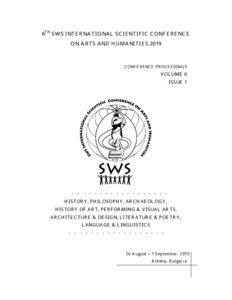Please use this identifier to cite or link to this item:
http://elar.tsatu.edu.ua/handle/123456789/9213Full metadata record
| DC Field | Value | Language |
|---|---|---|
| dc.contributor.author | Troitska, T. S. | - |
| dc.contributor.author | Krylova, K. M. | - |
| dc.contributor.author | Taranenko, Halyna | - |
| dc.contributor.author | Тараненко, Галина Григорівна | - |
| dc.contributor.author | Тараненко, Галина Григорьевна | - |
| dc.contributor.author | Troitska, E. M. | - |
| dc.contributor.author | Popravko, Olha | - |
| dc.contributor.author | Поправко, Ольга Вікторівна | uk |
| dc.contributor.author | Поправко, Ольга Викторовна | uk |
| dc.date.accessioned | 2020-01-20T12:36:41Z | - |
| dc.date.available | 2020-01-20T12:36:41Z | - |
| dc.date.issued | 2019 | - |
| dc.identifier.uri | http://elar.tsatu.edu.ua/handle/123456789/9213 | - |
| dc.description.abstract | The research aim is to define and substantiate the methodological guidelines for the historical reconstruction of Ukrainian philosophical tradition of axiology of the nature. First of all, the research methodology as a synthesized self-reflection of historical humanities, in the search for new knowledge, should be based on human-centered approaches, principles and methods and it has to take into account evolutionary changes in the world society, the conceptual and historical-contextual influence on human consciousness. In the article on the basis of philosophical, general scientific and specific historical methodology, with the help of historical-genetic and historical-comparative methods, there have been explicated the new guidelines for the theoretical reconstruction of the eco-friendly tradition of the Ukrainian people, presented as the value-semantic concentrated form by the philosophical anthropological thought. The scientific novelty is that historical reconstruction at all levels of the methodology is presented as a construct of axiological reproduction of the cultural memory of the people, in particular its value-semantic relation to nature: analyzed analytical and phenomenological methods of studying the problem; Interpreted the value-semantic potential of the axiology of nature G. Skovoroda, M. Gogol, I. Franko, V. Vernadsky, who long before the "cataclysms" in the system "nature - society" formed the ideas of co-evolution, genetic priority, ecological imperative, ethics of responsibility. The study proves the need to rethink the value-normative method of understanding the value of nature, the transition to a cognitive-communicative method of acquiring new knowledge and a wide range of scientific procedures. In the article, the current requirements to historical humanities are defined as the orientation to postmetaphysical thinking, linguistic turn, the specification of the reason and rejection from the advantages of theory over practice. All of this enables the theoretical reconstruction of the domestic philosophical tradition and renews the cultural memory of the people, in particular, the value-semantic attitude of man to the nature. The analytical and phenomenological methods, taking into account the living world and ethno-cultural variability of the value-normative method, cognitive-communicative process of acquiring the new knowledge ensure the correction of value determinants for modern humans. The axiological positions of G. Skovoroda, I. Franko, V. Vernadsky in defining the ecological determinants of the development of the "Man-Nature" system must be recognized as a movement to advance. | uk |
| dc.language.iso | en | uk |
| dc.relation.ispartofseries | 6th SWS International Scientific Conference on Arts and Humanities 2019;Vol. 6, ISSUE 1 (P. 107-113) | - |
| dc.subject | analytical methods | uk |
| dc.subject | axiology | uk |
| dc.subject | eco-friendly tradition | uk |
| dc.subject | culrural memory | uk |
| dc.subject | methodology | uk |
| dc.subject | noosphere | uk |
| dc.subject | phenomelogical methods | uk |
| dc.subject | reconstruction | uk |
| dc.title | Historical reconstruction of the reproduction of axiology of nature in ukrainian philosophical tradition: methodological reference points | uk |
| dc.type | Article | - |
| Appears in Collections: | кафедра Суспільно-гуманітарні науки | |
Files in This Item:
| File | Description | Size | Format | |
|---|---|---|---|---|
| HISTORICALRECONSTRUCTIONOFTHEREPRODUCTIONOFAXIOLOGYOFNATUREINUKRAINIANPHILOSOPHICALTRADITION.pdf | 1.01 MB | Adobe PDF |  View/Open |
Show simple item record
CORE Recommender
???jsp.display-item.check???
Items in DSpace are protected by copyright, with all rights reserved, unless otherwise indicated.
